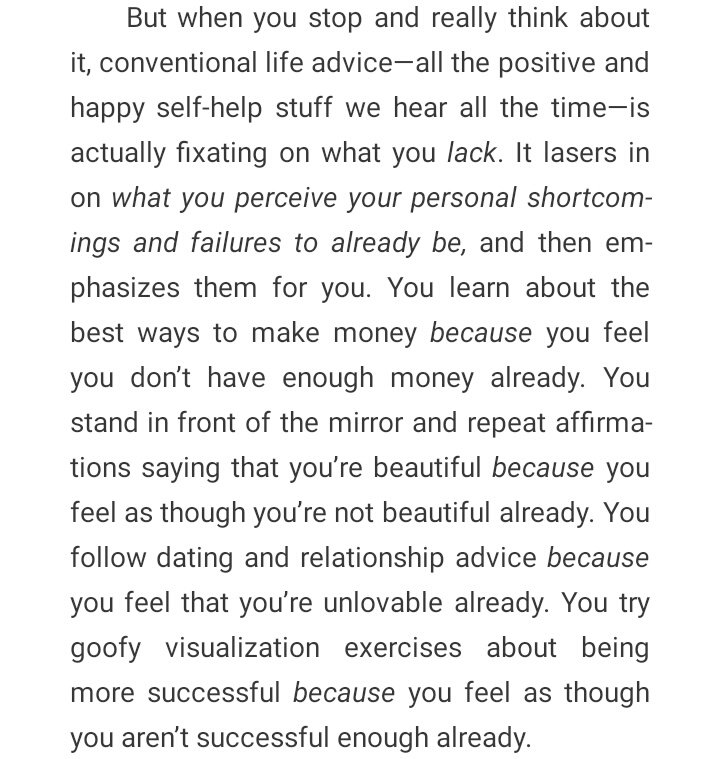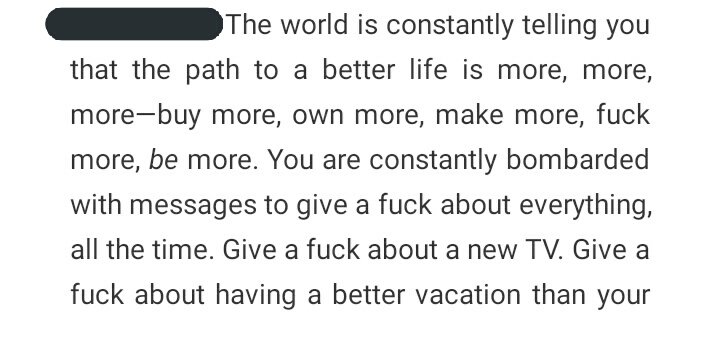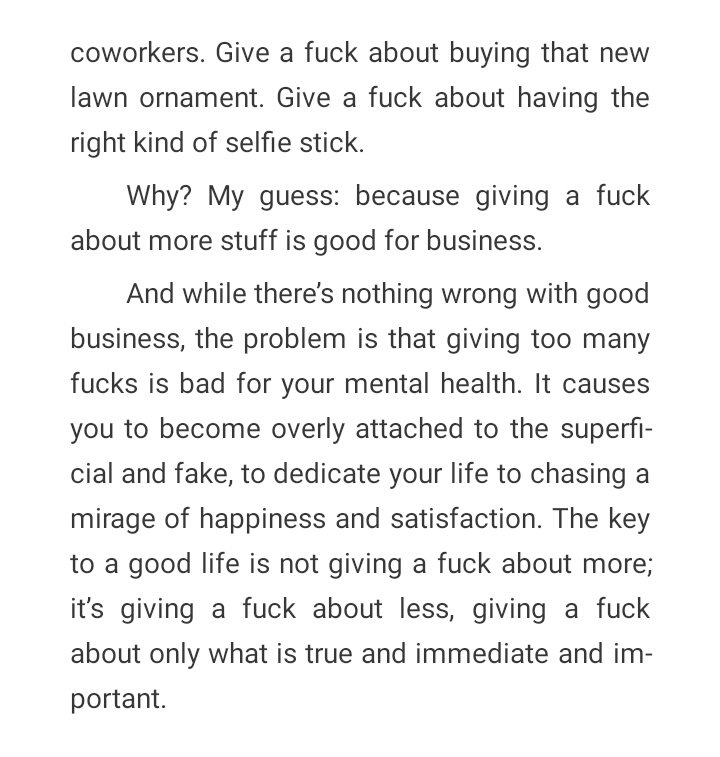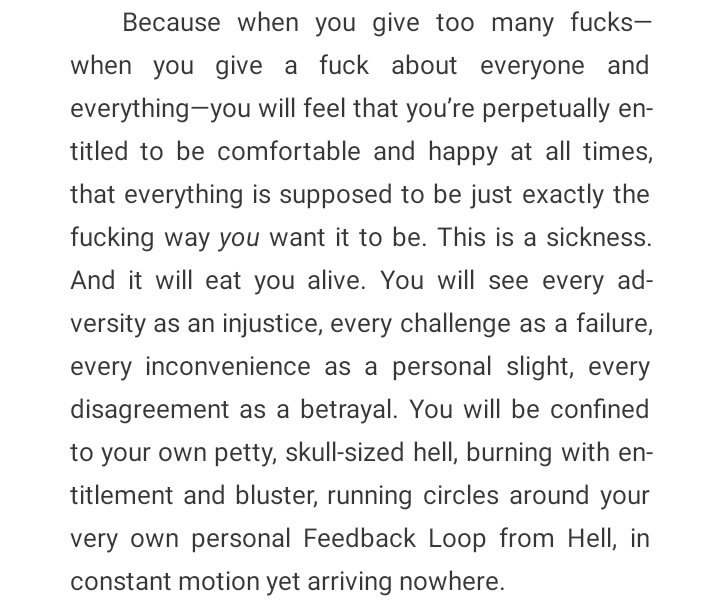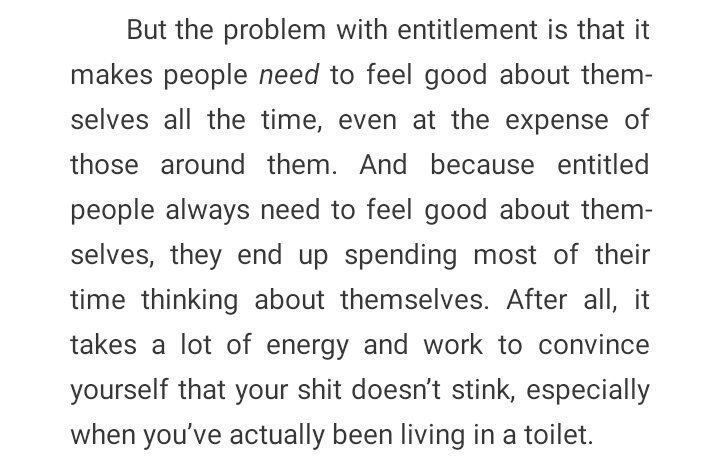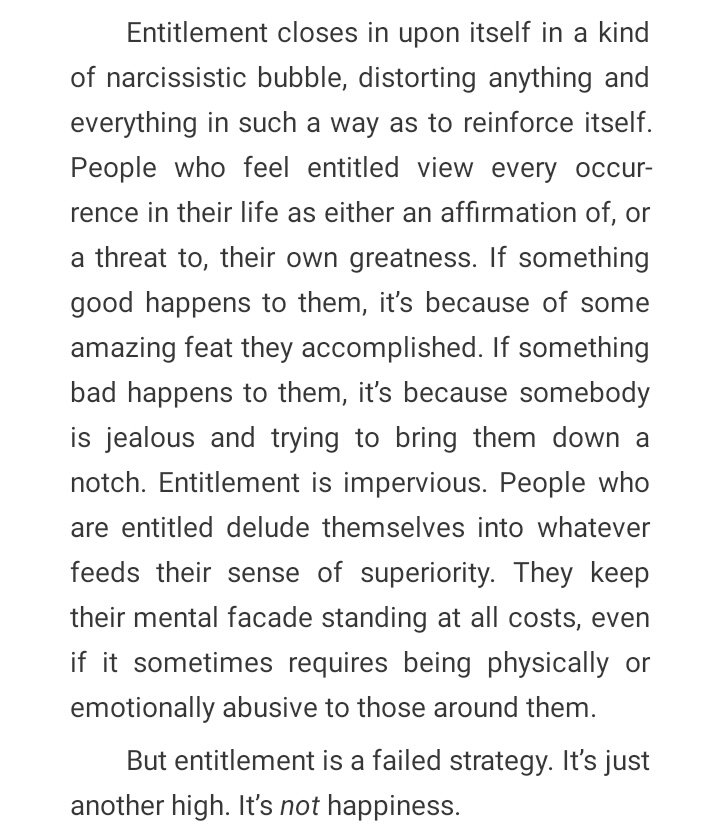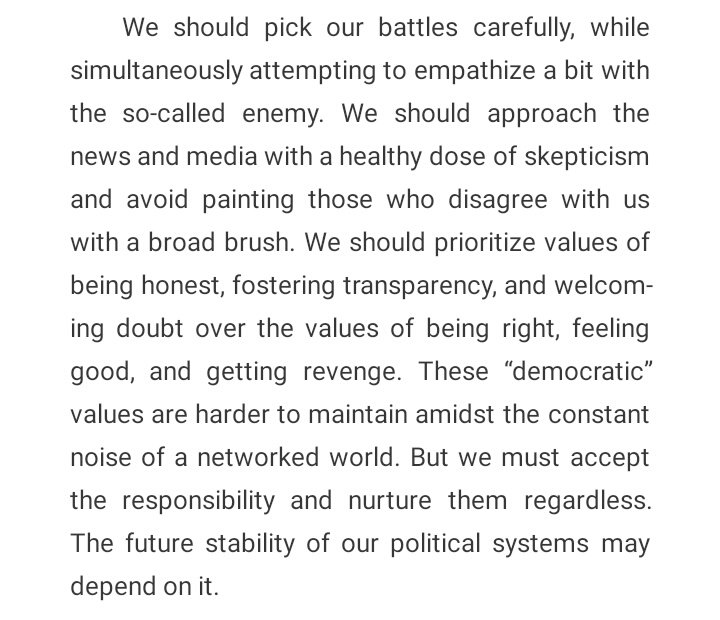A thread of quotes from & #39;The Subtle Art of Not Giving a F*ck& #39; that everyone needs to hear.
1) Self-improvement and success often occur together. But that doesn’t necessarily mean they’re the same thing.
2) When you stop and really think about it, conventional life advice—all the positive and happy self-help stuff we hear all the time—is actually fixating on what you lack. It lasers in on what you perceive...
3) Ironically, this fixation on the positive—on what’s better, what’s superior—only serves to remind us over and over again of what we are not, of what we lack, of what we should have been but failed to be. (1/2)
After all, no truly happy person feels the need to stand in front of a mirror and recite that she’s happy. She just is. (2/2)
4) The world is constantly telling you that the path to a better life is more, more, more—buy more, own more, make more, fck more, be more. You are constantly bombarded with messages to give a fck about everything, all the time...
5) Everything worthwhile in life is won through surmounting the associated negative experience. Any attempt to escape the negative, to avoid it or quash it or silence it, only backfires. The avoidance of suffering is a form of suffering. (1/2)
The avoidance of struggle is a struggle. The denial of failure is a failure. Hiding what is shameful is itself a form of shame. (2/2)
6) When you give a fck about everyone and everything—you will feel that you’re perpetually entitled to be comfortable and happy at all times, that everything is supposed to be just exactly the fcking way you want it to be. This is a sickness. And it will eat you alive...
7) Not giving a fck does not mean being indifferent; it means being comfortable with being different.
8) If you find yourself consistently giving too many fcks about trivial sht that bothers you, chances are you don’t have much going on in your life to give a legitimate fck about.
9) Once you become comfortable with all the sht that life throws at you (and it will throw a lot of sht, trust me), you become invincible in a sort of low-level spiritual way. After all, the only way to overcome pain is to first learn how to bear it.
10) “Don’t hope for a life without problems,” the panda said. “There’s no such thing. Instead, hope for a life full of good problems.”
11) The more you rely on them to feel better about your underlying problems, the more you will seek them out. In this sense, almost anything can become addictive, depending on the motivation behind using it. (1/2)
We all have our chosen methods to numb the pain of our problems, and in moderate doses there is nothing wrong with this. But the longer we avoid and the longer we numb, the more painful it will be when we finally do confront our issues. (2/2)
12) Emotions are part of the equation of our lives, but not the entire equation. Just because something feels good doesn’t mean it is good. Just because something feels bad doesn’t mean it is bad. (1/2)
Emotions are merely signposts, suggestions that our neurobiology gives us, not commandments. Therefore, we shouldn’t always trust our own emotions. In fact, I believe we should make a habit of questioning them. (2/2)
13) Happiness requires struggle. It grows from problems. Joy doesn’t just sprout out of the ground like daisies and rainbows. Real, serious, lifelong fulfillment and meaning have to be earned through the choosing and managing of our struggles.
14) Who you are is defined by what you’re willing to struggle for.
15) But the problem with entitlement is that it makes people need to feel good about themselves all the time, even at the expense of those around them...
16) Entitlement closes in upon itself in a kind of narcissistic bubble, distorting anything and everything in such a way as to reinforce itself.
17) It’s strange that in an age when we are more connected than ever, entitlement seems to be at an all-time high. Something about recent technology seems to allow our insecurities to run amok like never before. (1/3)
The more freedom we’re given to express ourselves, the more we want to be free of having to deal with anyone who may disagree with us or upset us. The more exposed we are to opposing viewpoints, the more we seem to get upset that those other viewpoints exist. (2/3)
The easier and more problem-free our lives become, the more we seem to feel entitled for them to get even better. (3/3)
18) The fact is, people who base their self-worth on being right about everything prevent themselves from learning from their mistakes. They lack the ability to take on new perspectives and empathize with others. They close themselves off to new and important information. (1/2)
It’s far more helpful to assume that you’re ignorant and don’t know a whole lot. This keeps you unattached to superstitious or poorly informed beliefs and promotes a constant state of learning and growth.
19) While there is something to be said for “staying on the sunny side of life,” the truth is, sometimes life sucks, and the healthiest thing you can do is admit it.
20) “One day, in retrospect, the years of struggle will strike you as the most beautiful.”
21) We don’t always control what happens to us. But we always control how we interpret what happens to us, as well as how we respond.
22) The biggest problem w/ victimhood chic is that it sucks attention away from actual victims. It’s like the boy who cried wolf. The more people there are who proclaim themselves victims over tiny infractions, the harder it becomes to see who the real victims actually are. (1/2)
People get addicted to feeling offended all the time because it gives them a high; being self-righteous and morally superior feels good. (2/2)
23) We should pick our battles carefully, while simultaneously attempting to empathize a bit with the so-called enemy. We should approach the news and media with a healthy dose of skepticism and avoid painting those who disagree with us with a broad brush...
24) You are already choosing, in every moment of every day, what to give a fck about, so change is as simple as choosing to give a fck about something else.
It really is that simple. It’s just not easy.
It really is that simple. It’s just not easy.
25) We shouldn’t seek to find the ultimate “right” answer for ourselves, but rather, we should seek to chip away at the ways that we’re wrong today so that we can be a little less wrong tomorrow.
26) Certainty is the enemy of growth. Nothing is for certain until it has already happened—and even then, it’s still debatable. That’s why accepting the inevitable imperfections of our values is necessary for any growth to take place. (1/3)
Instead of striving for certainty, we should be in constant search of doubt: doubt about our own beliefs, doubt about our own feelings, doubt about what the future may hold for us unless we get out there and create it for ourselves. (2/3)
Instead of looking to be right all the time, we should be looking for how we’re wrong all the time. Because we are. (3/3)

 Read on Twitter
Read on Twitter